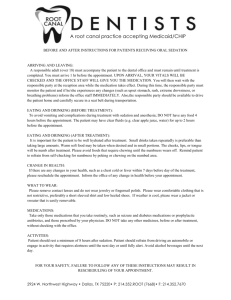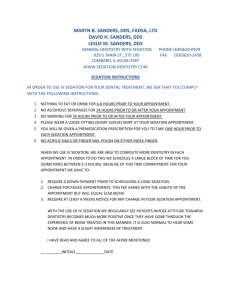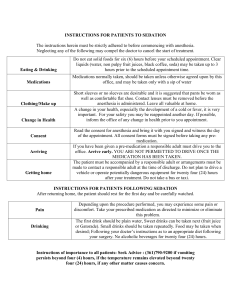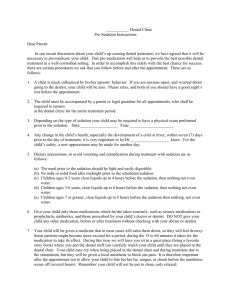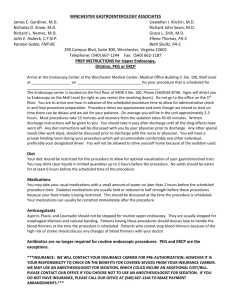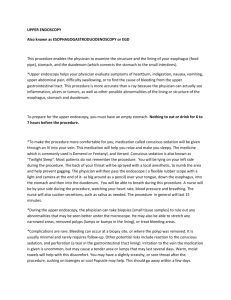Oesophago- gastro Duodenoscopy (OGD)
advertisement
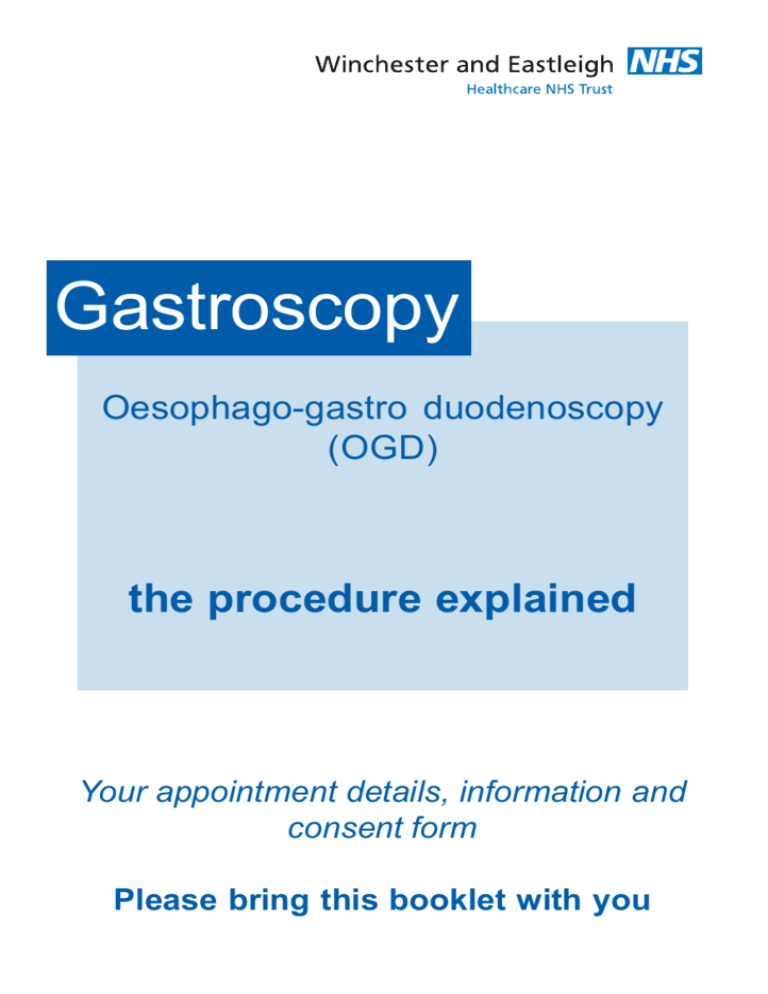
Gastroscopy Oesophago-gastro duodenoscopy (OGD) the procedure explained Your appointment details, information and consent form Please bring this booklet with you For your information: your appointment An appointment for your Gastroscopy has been arranged at: Andover Day and date Time Winchester Romsey Andover Day Surgery Unit, tel: 01264 835366 Winchester Endoscopy Unit, tel: 01962 828322 Romsey Endoscopy Unit, tel: 01962 825058 Please telephone the Endoscopy Department on the above numbers if this is not convenient or you would like to discuss any aspect of the procedure before your appointment. For our information: collection details Please write your relative’s or friend’s name and telephone number below Name Telephone number Introduction You have been advised by your GP or hospital doctor to have an investigation known as a gastroscopy (OGD). This procedure requires your formal consent. If you are unable to keep your appointment, please notify the department as soon as possible. This will enable the staff to give your appointment to someone else and they will be able to arrange another date and time for you. This booklet has been written to enable you to make an informed decision in relation to agreeing to the investigation and whether you wish sedation to be used. At the back of the booklet is the consent form. 1 If however there is anything you do not understand or wish to discuss further but still wish to attend do not sign the form, but bring it with you and you can sign it after you have spoken to a health care professional. The consent form is a legal document, therefore please read it carefully. Once you have read and understood all the information including the possibility of complications and you agree to undergo the investigation, please sign and date the consent form. You will notice that the consent form is carbonised, allowing you to keep a copy for your records, please fill it in while it is still attached to this booklet. What is an OGD? The procedure you will be having is called an oesophago-gastroduodenoscopy (OGD) sometimes known more simply as a gastroscopy or endoscopy. This is an examination of your oesophagus (gullet), stomach and the first part of your small bowel called the duodenum. The instrument used in this investigation is called a gastroscope. It is flexible and has a diameter less than that of a little finger. Each gastroscope has an illumination channel which enables light to be directed onto the lining of your upper digestive tract and another which relays pictures back to the endoscopist onto a television screen. During the investigation, the doctor may need to take some tissue samples (biopsies) from the lining of your upper digestive tract for analysis: this is painless. The samples will be retained. A video recording and/or photographs may be taken for your records. The procedure will be performed by or under the supervision of a trained doctor or nurse endoscopist, and we will make the investigation as comfortable as possible for you. Some patients have sedation injected into a vein for this procedure, although 2 others prefer to remain awake and have local anaesthetic throat spray. Why do I need to have an OGD? You have been advised to undergo this investigation to try and find the cause for your symptoms, help with treatment and if necessary, to decide on further investigation. There are many reasons for this investigation including: indigestion; anaemia; weight loss; vomiting; passing black motions, vomiting blood or difficulty swallowing. A barium meal x-ray examination is an alternative investigation. It is not as informative as an endoscopy and has the added disadvantage that tissue samples canot be taken. Preparation Eating and Drinking It is necessary to have clear views and for this the stomach must be empty. Therefore do not have anything to eat for at least 6 hours before the test. Small amounts of water are safe up to two hours before the test. If your appointment is in the morning have nothing to eat after midnight but you may have a drink at 6am. If your appointment is in the afternoon you may have a light breakfast no later than 8 am and small amounts of water until 2 hours before your appointment. 3 What about my medication? Your routine medication should be taken. Digestive Medication If you are presently taking tablets to reduce the acid in your stomach please discontinue them 2 weeks before your investigation. If you are having a follow up OGD to check for healing of an ulcer found during the last 2-3 months, then please continue your acid reducing medications right up to the day before your repeat endoscopy. If unsure please telephone the unit. Diabetics If you are a diabetic controlled on insulin or medication please ensure the Endoscopy department is aware so that the appointment can be made at the beginning of the list. Please see guidelines printed in the back of the book. Anticoagulants/allergies. Please telephone the unit if you are taking anticoagulants e.g. warfarin. Phone for information if you have a latex allergy. How long will I be in the endoscopy department? This largely depends upon whether you have sedation and also how busy the department is. You should expect to be in the department for approximately 1-3 hours. The department also looks after emergencies and these can take priority over outpatient lists. What happens when I arrive? When you arrive in the department you will be met by a qualified nurse who will ask you a few questions, one of which concerns your arrangements for getting home. You will also be able to ask further questions about the investigation. The nurse will ensure you understand the procedure and discuss any outstanding concerns or questions you may have. 4 You will be offered the choice of sedation or local anaesthetic throat spray (this is dealt with in more detail in the next section of this booklet) If you have sedation, the nurse may insert a small cannula (small plastic tube) into a vein usually on the back of your hand through which the sedation will be administered later. If you have sedation you will not be permitted to drive home or use public transport alone, so you must arrange for a family member of friend to collect you. The nurse will need to be given their telephone number so that she can contact them when you are ready for discharge. You will have a brief medical assessment with a qualified endoscopy nurse who will ask you some questions regarding your medical condition and any past surgery or illness you have had to confirm that you are sufficiently fit to undergo the investigation. Your blood pressure and heart rate will be recorded and if you are diabetic, your blood glucose level will also be recorded. Should you suffer from breathing problems a recording of your oxygen levels will be taken. If you have not already done so, and you are happy to proceed, you will be asked to sign your consent form at this point. Sedation or throat spray? Intravenous sedation or topical local anaesthetic throat spray can improve your comfort during the procedure so that the endoscopist can perform the procedure successfully. Intravenous sedation The sedation will be administered into a vein in your hand or arm which will make you lightly drowsy and relaxed but not unconscious. You will be in a state called co-operative sedation: this means that, although drowsy, you will still hear what is said to you and therefore will be able to follow simple instructions during the investigation. Sedation also makes it unlikely that you 5 will remember anything about the procedure. You will be able to breathe quite normally throughout. Whilst you are sedated we will check your breathing and heart rate so changes will be noted and dealt with accordingly. For this reason you will be connected by a finger probe to a pulse oximeter which measures your oxygen levels and heart rate during the procedure. Your blood pressure may also be recorded. Please note that if you decide to have sedation you are not permitted to drive, take alcohol, operate heavy machinery or sign any legally binding documents for 24 hours following the procedure and you will need someone to accompany you home. Anaesthetic throat spray With this method sedation is not used, but the throat is numbed with a local anaesthetic spray. As the gastroscopes have become thinner many patients are happy for the procedure to be carried out without sedation and to have throat spray instead. The throat spray has an effect very much like a dental injection. The benefit of choosing throat spray is that you are fully conscious and aware and can go home unaccompanied almost immediately after the procedure. You are permitted to drive and carry on life as normal. The only constraint is that you must not have anything to eat or drink for about an hour after the procedure, until the sensation in your mouth and throat has returned to normal. It is strongly advised that when having your first drink after the procedure, it should be a cold drink and should be sipped to ensure you do not choke. The OGD examination In turn you will be escorted into the procedure room where the endoscopist and the nurses will introduce themselves and you will have the opportunity to ask any final questions. 6 If you have any dentures you will be asked to remove them at this point, any remaining teeth will be protected by a small plastic mouth guard which will be inserted immediately before the examination commences. If you are having local anaesthetic throat spray this will be sprayed onto the back of your throat whilst you are sitting up and swallowing: the effect is rapid and you will notice loss of sensation to your tongue and throat. The nurse looking after you will ask you to lie on your left side and will then place the oxygen monitoring probe on your finger. If you have decided to have sedation, the drug will be administered into a cannula (tube) in your vein and you will quickly become sleepy. Any saliva or other secretions produced during the investigation will be removed using a small suction tube, again rather like the one used at the dentist. The endoscopist will introduce the gastroscope into your mouth, down your oesophagus into your stomach and then into your duodenum. Your windpipe is deliberately avoided and your breathing will be unhindered. During the procedure samples may be taken from the lining of your digestive tract for analysis in our laboratories. These will be retained. Any photographs will be recorded in your notes. Risks of the procedure Upper gastrointestinal endoscopy is classified as an invasive investigation and because of that it has the possibility of associated complications. These occur extremely infrequently; we would wish to draw your attention to them and so with this information you can make your decision. The doctor who has requested the test will have considered this. The risks must be compared to the benefit of having the procedure carried out. 7 The risks can be associated with the procedure itself and with administration of the sedation. The endoscopic examination The main risks are of mechanical damage to teeth or bridgework; perforation or tear of the lining of the stomach or oesophagus (risk approximately 1 in 2000 cases) and bleeding which could entail you being admitted to hospital. Certain cases may be treated with antibiotics and intravenous fluids. Perforation may require surgery to repair the hole. Bleeding may occur at the site of biopsy, and nearly always stops on its own. Sedation Sedation can occasionally cause problems with breathing, heart rate and blood pressure. If any of these problems do occur, they are normally short lived. Careful monitoring by a fully trained endoscopy nurse ensures that any potential problems can be identified and treated rapidly. Older patients and those who have significant health problems, for example, people with significant breathing difficulties due to a bad chest may be assessed by a doctor before being treated. After the procedure You will be allowed to rest for as long as is necessary. Your blood pressure and heart rate will be recorded and if you are diabetic, your blood glucose will be monitored. Should you have underlying difficulties or if your oxygen levels were low during the procedure, we will continue to monitor your breathing and can administer additional oxygen. Once you have recovered from the initial effects of any sedation (which normally takes 30 minutes) you will be offered a snack and moved into a comfortable chair. Before you leave the department, the nurse or doctor will explain the findings and any medication or further investigations required. She or he will also inform you if you require further appointments. 8 Since sedation can make you forgetful it is a good idea to have a member of your family or a friend with you when you are given this information although there will be a short written report given to you. If you have had sedation you may feel fully alert following the investigation, however the drug remains in your blood system for about 24 hours and you can intermittently feel drowsy with lapses of memory. If you live alone, try and arrange for someone to stay with you, or if possible, arrange to stay with your family or a friend for at least 4 hours. If the person collecting you leaves the department, the nursing staff will telephone them when you are ready for discharge. General points to remember z If you are unable to keep your appointment please notify the endoscopy unit as soon as possible. z It is our aim for you to be seen and investigated as soon as possible after your arrival. However, the department is very busy and your investigation may be delayed. If emergencies occur, these patients will obviously be given priority over less urgent cases. z The hospital cannot accept any responsibility for the loss or damage to personal property during your time on these premises. z If you have any problems with a persistent sore throat, worsening chest or abdominal pain, please contact your GP immediately informing them that you have had an endoscopy. z If you are unable to contact or speak to your doctor, you must go immediately to the hospitals accident and emergency department. 9 Guidelines for people with diabetes undergoing upper GI endoscopy (Gastroscopy) Adjusting therapy As a diabetic you will need to adjust your treatment according to the timing of the appointment. As a result your blood sugar control may be a little higher than usual. This is only temporary to maintain your blood sugars through the procedure and you will be back to your usual level of control within 24 – 48 hours of the procedure. Avoiding hypoglycaemia To avoid hypoglycaemia, your medication will need adjusting the evening before the procedure and may need to be omitted or reduced on the morning of the procedure. Dose adjustment advice If you have concerns about adjusting your dosage, please contact the Diabetes Nursing Team on 01962 825301, well in advance of the appointment, to discuss appropriate measures. Carrying glucose to treat hypoglycaemia On the day of the procedure, carry Glucose Tablets in case of hypoglycaemia. As these are absorbed quickly through the tissues of the mouth, if sucked, they will not interfere with the procedure. Take three (3) tablets initially, followed by a further three (3) if symptoms continue after 5 minutes. If your medication has been adjusted this should not be a problem. Blood glucose monitoring If you usually test your blood sugar levels, check them as usual, on the morning of the procedure and carry your equipment with you to the appointment. If you do not usually test your blood, do not worry, your blood levels will be checked when you arrive for the procedure. 10 Instructions for your appointment Please check the appropriate section, type of treatment and time of procedure, for your appointment information Morning appointment People on insulin z z z z z z You should have nothing to eat after midnight but may have drinks up to 6.00am, if you feel hypoglycaemic take glucose tablets. Make sure that you have planned changes to your insulin dose for the evening before. Reduce your evening insulin dose by a third; eg If taking Mixtard 30 : 30 units at evening meal reduce to 20 units. If taking pre meal short acting insulin 3times daily and 18 units Insulatard (Basal) at 10pm reduce the basal insulin to 12units Do not take your morning dose of insulin bring your insulin with you to have after the procedure If you are still in doubt contact the Diabetes Nursing Team Report to the nursing staff if you have needed glucose before arriving and inform them immediately if you feel ‘hypo’ at any time of your visit. Your morning dose of insulin can be given as soon as you are able to eat and drink safely; the nursing staff will inform you when this is safe. 11 Afternoon appointment People on insulin z z z z z You should have nothing to eat or drink after 7.30am, if you feel hypoglycaemic take glucose tablets. Make sure that you have made plans to reduce your morning dose of insulin. You will need to reduce the dose by half; eg Mixtard 30 : 24 units am; reduce to 12 units. Actrapid 12 units with breakfast; reduce to 6 units with early breakfast If still in doubt ring the Diabetes Nursing Team for advice. Report to the nursing staff if you have needed glucose before arriving and inform them immediately if you feel ‘hypo’ at any time during your visit. Your next dose of insulin can be given as soon as you are able to eat and drink safely, the nursing staff will inform you when this is safe. Morning appointment People on diabetes tablets You should have nothing to eat after midnight but may have drinks up to 6.00am, if you feel hypoglycaemic take glucose tablets. z Make sure that you have planned changes to your tablet doses for the evening before. If you are taking Gliclazide or Glibenclamide reduce the evening dose by one tablet z It is not necessary to reduce your Metformin dose eg Gliclazide 80mg + Metformin 500mg – Do not take Gliclazide Glibenclamide 10mg + Metformin 850mg – Reduce Glibenclamide to 5mg z 12 Do not take your morning dose of tablets; bring your tablets with you to have after the procedure z If you are still in doubt contact the Diabetes Nursing Team z Report to the nursing staff if you have needed glucose before arriving and inform them immediately if you feel ‘hypo’ at any time during your visit. z Your dosage of tablets can be given as soon as you are able to eat and drink safely the nursing staff will inform you when this is safe. z Afternoon appointment People on diabetes tablets You should have nothing to eat or drink after 7.30am, if you feel hypoglycaemic take glucose tablets. z Make sure that you have made plans to reduce your morning dose of tablets. You need to stop your Gliclazide, glimepiride, glibenclamide, tolbutamide. If you are taking Pioglitazone (Starlix) or Rosiglitazone (Avandia) you should stop this tablet also; eg Gliclazide 80 mg + Metformin 500mg. Do not take the Gliclazide. Glibenclamide 10mg + Metformin 850mg; do not take Glibenclamide z If still in doubt ring the Diabetes Nursing Team for advice. z Report to the nursing staff if you have needed glucose before arriving and inform them immediately if you feel ‘hypo’ at any time during your visit. Your dosage of tablets can be given as soon as you are able to eat and drink safely, the nursing staff will inform you when this is safe. z this leaflet was produced by: Dr Hugh Shepherd FRCP MD MB BChir Consultant Gastroenterologist *** Sue Cramp Endoscopy Manager RGN, DipHM *** Dr David Hewett MsC MFPHM MBCS MHSM Assistant Medical Director (Risk and Litigation) Endoscopy Department Brinton Wing, Level C Royal Hampshire County Hospital Romsey Road Winchester Hampshire SO22 5DG Telephone: 01962 828322 archive/endoscopy/ogd booklet/oeosphago gastro duodensocopy booklet.p65 August 2005
